Everything we know about Surviving Mars, the colony-builder from the makers of Tropico
Including criminal colonists, mysterious anomalies, and disasters back on Earth that can affect your colony.
"I would be lying to you if I say we have never discussed this interesting side-scenario where the drones go into kill-all-humans mode," says Bisser Dyankov, producer at Tropico developer Haemimont Games, in response to a question about the studio's recently announced colony sim Surviving Mars. I'd asked about technology research in Surviving Mars, and whether it would be possible to unlock advanced AI for robots and drones, and if that could lead at some point to a robot revolt in the colony.
"The idea is obviously... it has been floating in the air," Bisser says.
Ivan-Assen Ivanov, Haemimont Games' technical director adds: "So something like a company-wide robot uprising, it's not off the table. It's not on the table as part of what we're showing now. It's definitely making rounds, around the table. We don't promise anything."
It's not unusual that the developers are being a bit cagey: Surviving Mars is in pre-alpha, and there's not even a playable build available for us to get some hands-on impressions. Still, here's everything we've learned about the survival colony-building game from the presentation and an interview at PDXCon in Stockholm last week—and keep in mind, some of this information may change during development.
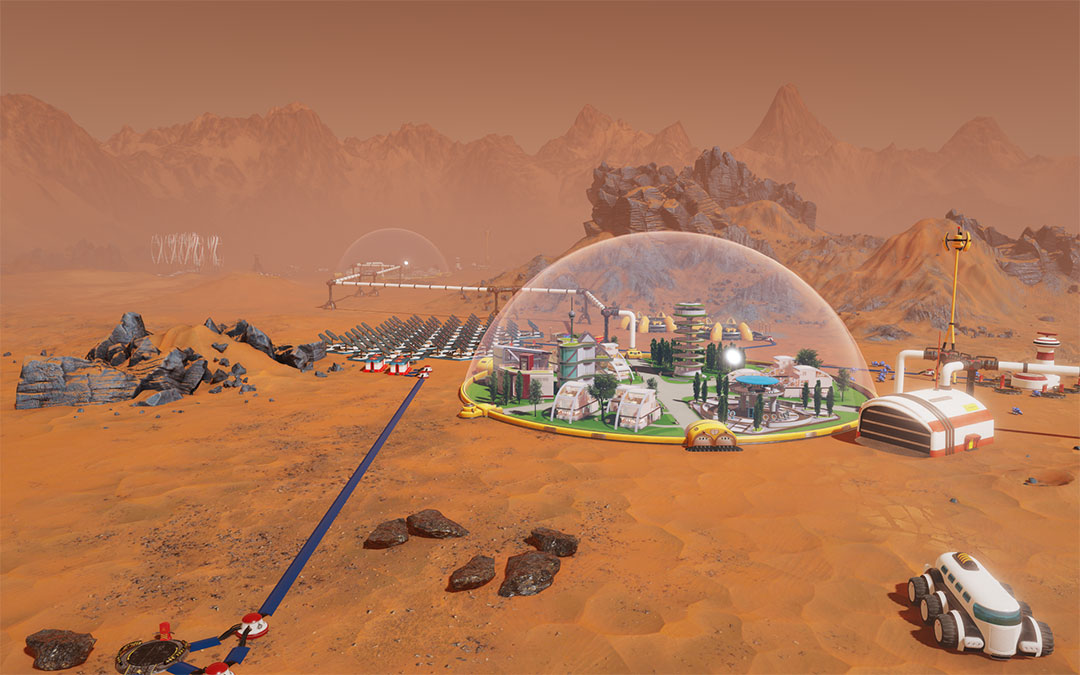
You begin by choosing a corporate sponsor for your colony mission
In the opening moments of Surviving Mars, you pick from a list of sponsors: the corporation or country that will fund your colony and will act as a lifeline and supply chain. They'll send rockets containing supplies and equipment, and as you mine resources on the Red Planet, you'll be able to refuel those reusable rockets, and send them on back to Earth.
Choosing your sponsor will dictate your starting funds, provide you with certain goals and milestones, determine how many rockets you have available to send back and forth, and will influence how fast you can build your colony. Your choice of sponsor may even result in penalties if you don't meet certain mission parameters.
"There is a lot of differences [between sponsors]," says Gabriel Dobrev, creative director. "There is a large difference between the initial supplies that you've got, so probably more rockets, more funding, so you can buy more expensive equipment. Later on, the sponsors reward different behavior. One of them may want you to have as big a colony as possible, bring a lot more people from Earth, the other ones might want you to extract precious metals and send them back to Earth.
Keep up to date with the most important stories and the best deals, as picked by the PC Gamer team.
"So they all reward different type of behavior. And also, they penalize particular behavior, and even can have an end-game condition, like, if somebody dies, you're out, mission is cancelled, so you lose the game essentially."
Mars is based on real data, but maps are randomized
After outfitting your initial rocket with equipment (rovers, transport vehicles, and orbital probes to explore the terrain), you'll select a landing site on Mars. You'll be able to examine your landing zone for the resources it contains, as well as identify different hazards such as dust storms (which can block out the sun and cover solar panels with dust) or extreme cold weather temperatures that can raise power requirements and freeze water supplies.
The landing sites are based on NASA's Mars data of the planet's features—you'll even able to locate the landing site of NASA's Curiosity Rover using real coordinates. However, the maps you play on will be randomly generated to provide an environment that lies somewhere between reality and fiction.
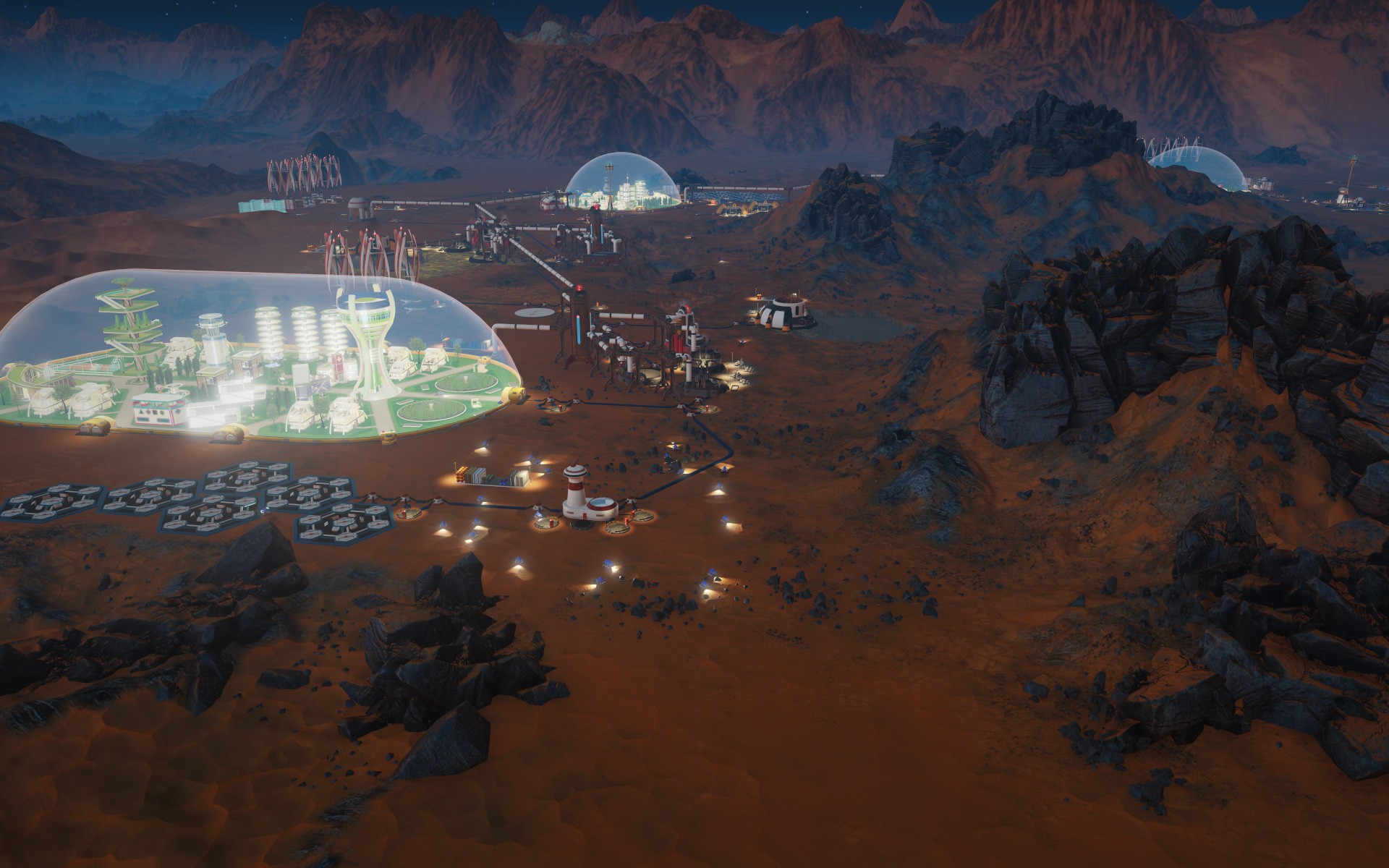
You prepare your colony with drones and robots: people come much later
After landing, you'll dispense a small army of drones and robots to begin preparing for the eventual colonization of humans. Place solar panels to generate power (and store surplus power in batteries for use when the sun goes down—there is a day-night cycle), connect power lines to various modules, build a drone hub to dispense your busy metal workers, and construct a tower to scan the area around your landing zone. Discovering new veins of resources will be paramount to the success of your colony: while you can bring some materials with you on your rocket (like concrete, metals, and polymers) and have more sent from Earth during resupply missions, this will only represent a tiny fraction of what you'll need for construction. Most of what you need will come from your surroundings, not from Earth.
Don't expect your first human colonist to arrive for a while, either. Before you can take one small step for man, your terrain will be well-worn with the tire tracks of your drones.
"The first people will arrive later on when there is habitable space, and all of the things that are required for life and for survival of people," says Dobrev. "And this will actually be a big milestone."
In the meantime, you'll construct machines to process resources on the planet, creating cement for buildings and harvesting water by tapping into ice deep underground and pumping it to the surface. You'll also begin converting the thin Mars atmosphere into breathable oxygen to be stored in tanks. Also important: creating fuel to send your reusable rocket back to Earth.
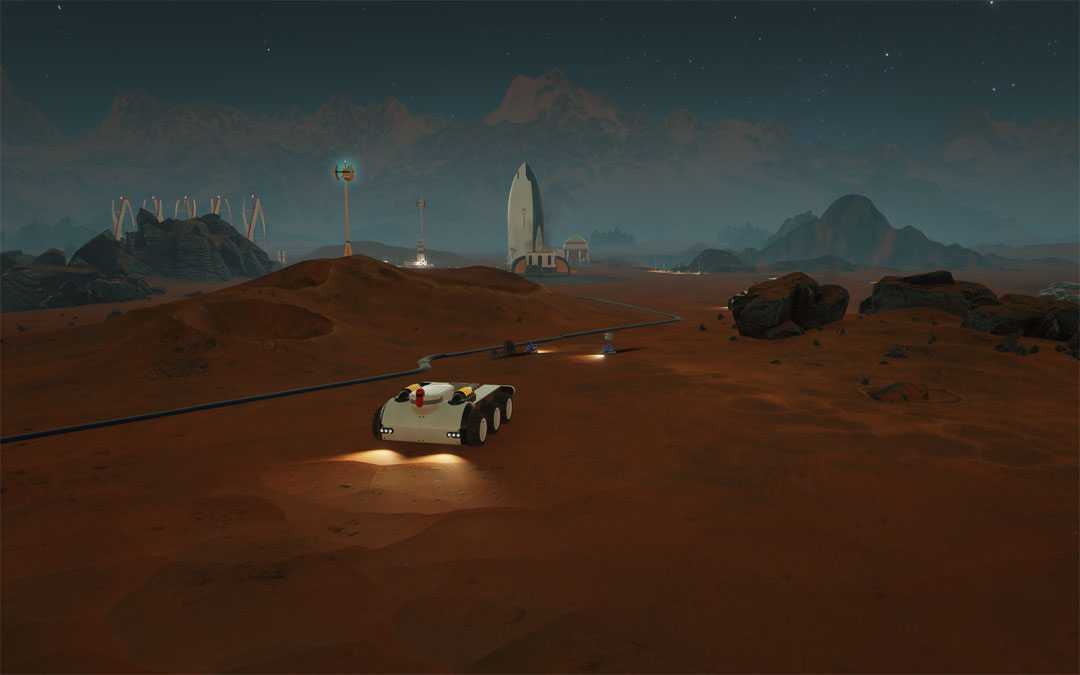
When colonists arrive, they'll begin researching (and drinking)
Once you've got a habitable space for human colonization, you can begin receiving colonists from Earth. It's not instantaneous: as Mars and Earth orbit the sun, they are rarely close enough to each other for a quick rocket trip, so at times the arrival of colonists and other supplies may be delayed.
Once humans have set foot on Mars, they'll begin to extend your colony further across the map, build additional outposts, research new technologies, and of course, have a little bit of fun.
"Once we have a sort of stable and working colony there, a lot of advances will happen immediately, because people will be present there, thinking, exploring, researching, and so on," says Dobrev.
"There is also entertainment, which is, build a space bar," he adds. "Because you can't do without bars. That's a given."
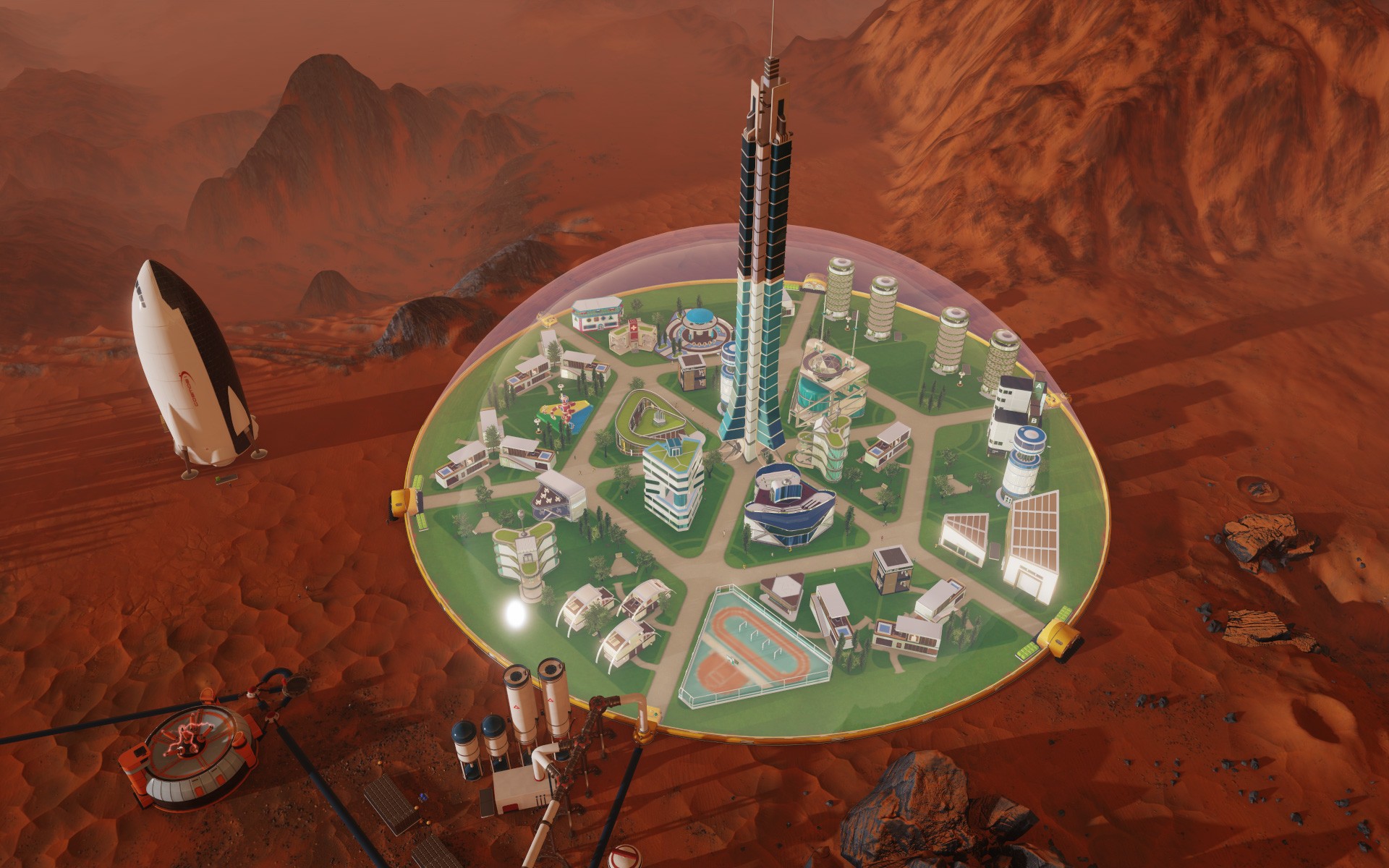
You can decide what kind of colonists you want by filtering them by their traits
You don't have to allow just any John Q. Earthling into your Mars colony. Each human has traits, like ambitious, tough, frail, workaholic, survivor, and so on. This means you can set standards for who gets to join your effort on Mars.
"You can pre-select, you can filter for that, you can say 'I don't want any frail guys in my colony' but of course that will limit the number of people that will want to come," says Dobrev.
Once you've got humans in your colony, you can also sort them by trait into different areas. For example, you can relocate your workaholics into high-production areas and assign creative types to completing research. This isn't like Cities: Skylines, where your citizens determine their own fates and activities: you'll be able to direct your colonists to work at specific jobs and complete tasks.
Unhappy colonists can commit crimes, lose their minds, or just go back home to Earth
There are four important parameters you'll need to manage and monitor in your colonists. The most obvious is physical health: making sure they have enough food, water, and oxygen, plus insuring they live and work in domes with the proper amount of air pressure and temperature levels.
"We also have the mental health, sanity, which is how well this affects your psyche," says Dobrev. "If you don't feel secure in your environment or if you experience too often a crisis where you don't have access to oxygen, or you're going out on a very long and stressful mission, this is all going to have a reflection on you."
There's also colonist morale. "This is how much individuals' desires are aligned with the colony. If this gets too low, the individual becomes a renegade and he starts thinking about himself and doing his own thing instead of following the goals of the colony, and this is how you get crime."
How do you deal with crime? Form a Mars police force.
"At some point you will need to have some form of law enforcement. When a group of people becomes larger, potentially going to thousands, then you definitely need some form of structure in the society and making sure that everybody's not stepping on the toes of anybody else, more or less."
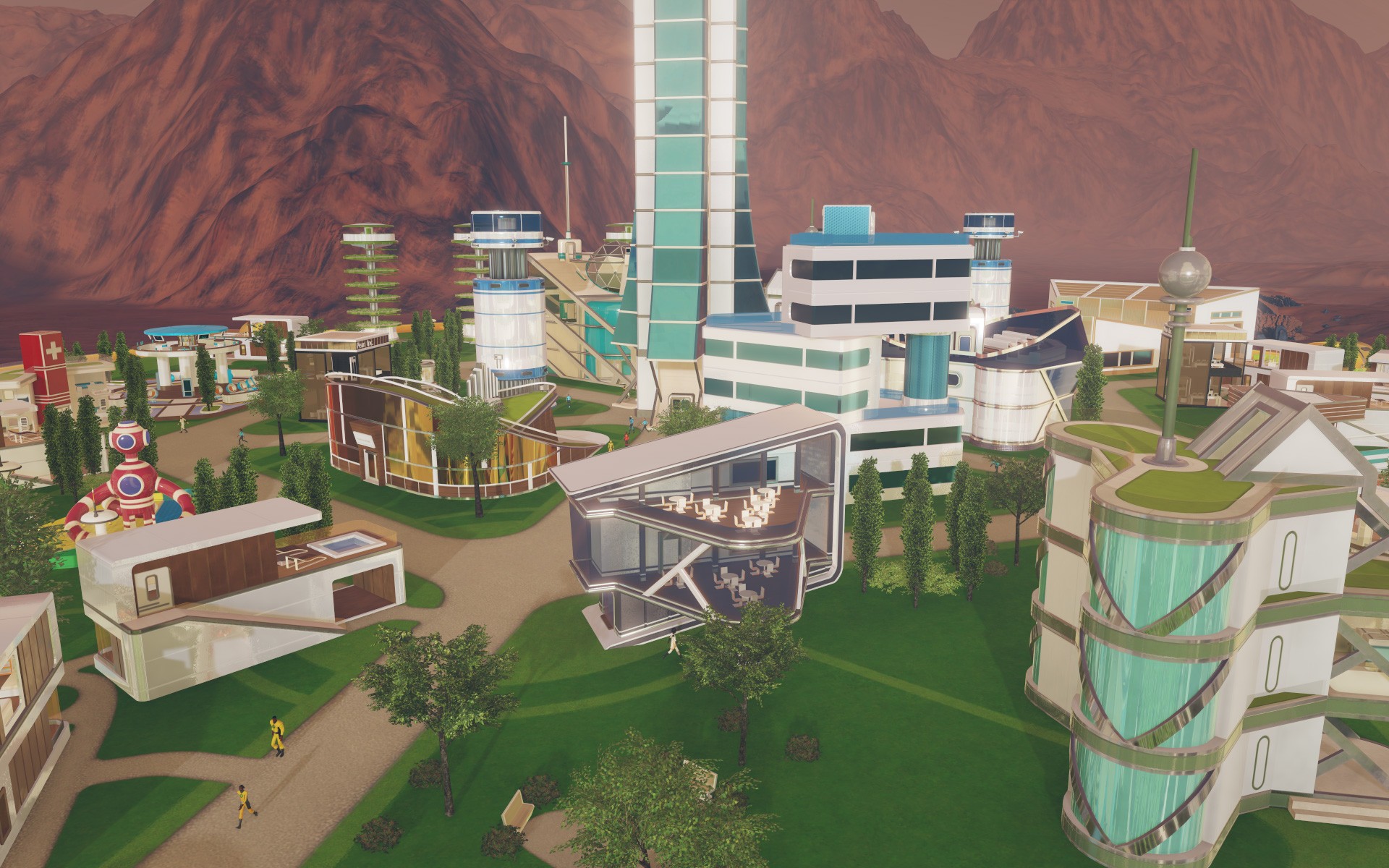
When your colonists are comfortable enough, they'll start having children
The fourth parameter is comfort level: how confident your colonists feel that they are in a suitable living environment. If the comfort level is too low, colonists can decide they'd rather go back to Earth, and will hop on the next available rocket home (provided, of course, there's enough fuel for the rocket to take off).
If a colonist's comfort level is high enough, they may decide to start having children, providing you with a new supply of colonists without having to call for more from home. This is especially important because while you may be dealing with problems in your colony, there might be even bigger problems brewing on another planet: Earth.
Earth might not always be there for you
Earth represents your supply chain for certain resources, such as food (until you begin growing your own) and especially for additional colonists (until you begin creating your own), so if your corporate sponsor runs into problems, or if the planet itself experiences a calamity, it could severely impact your colony. And that may just happen.
"It could be, for example, if you are sent by a corporation," Dobrev says, "it could go bankrupt. Or, there could be World War III, or there could be something making a disease that is essentially threatening Earth, so you can't really get colonists from there.
"Again, a lot of things that can eventually happen and we want to keep this element a little bit randomized, so that you don't always know what's going to happen to Earth and there is no ultimate security that Earth will always be there for you to help you out."
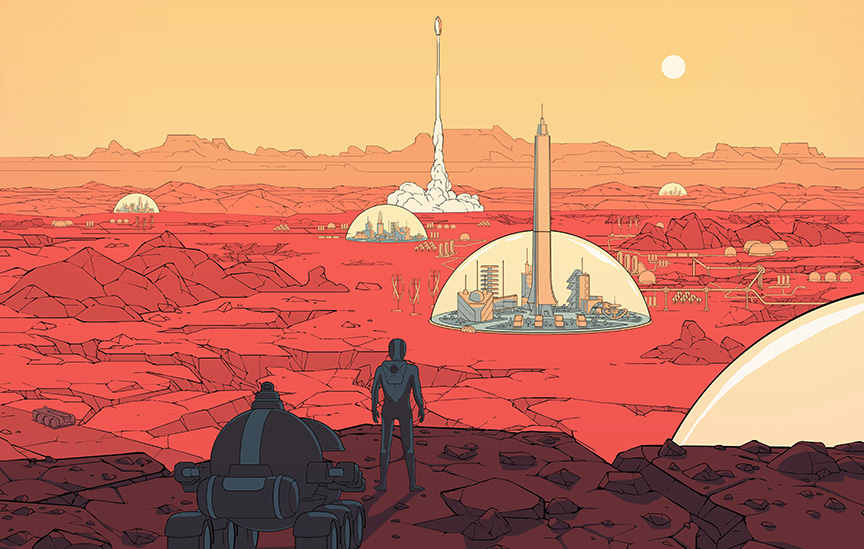
'Mysteries' allow for fantastical sci-fi events
Back to the robot uprising I mentioned earlier—and remember, it hasn't been confirmed, it's just one of many ideas that have been discussed by the developers. If there is an AI revolt, though, it would be part of special events the developers are calling 'mysteries.' While Surviving Mars is mostly based on real science and technology, the developers also want to allow for more wild, far-fetched situations.
"With the mysteries, we allow ourselves to go haywire, nodding to classic sci-fi and weird ideas," says Dyankov. "And the way the mystery is structured, it's a different story for each playthrough inviting the player to go and interact with it, having an effect on the gameplay. It could be something like an object materializing from [another] dimension, you know?"
Mars, after all, represents a new frontier. "Who knows what's there? Maybe aliens, maybe kill-all-humans."
Mysteries are optional, though
Not interested in fantastical events involving aliens, other dimensions, or robot uprisings? Want to stick to science instead of science-fiction? No problem. Players don't need to get involved with Surviving Mars' mysteries if they choose not to.
"The important thing with those mysteries is to understand that the player will be also able to, in the initial stages, say that 'I don't want to experience any mystery.' So the sandbox experience is there but the mystery is something on top that we invite the player to engage in with different playthroughs."
It's a sandbox
"The idea is not that there is any fixed goal," Dobrev says. "That you have to achieve this and then you're done. There is practically no victory screen. You play and you can set up your own goals. You can try to follow the mystery and get to its end. You can try to get the first colonist to Mars sooner or you can try to reach a self-sustaining level of your colony sooner but that's not a set goal.
"These are all goals that we'll be tracking for you and it will be easy if you want to follow them to see how well you're doing, but that's not something that we're putting in front of you and saying, like, you have to do this or you have to do that. It's a sandbox."
There's no release date yet, but Surviving Mars is expected to arrive sometime in 2018.

Chris started playing PC games in the 1980s, started writing about them in the early 2000s, and (finally) started getting paid to write about them in the late 2000s. Following a few years as a regular freelancer, PC Gamer hired him in 2014, probably so he'd stop emailing them asking for more work. Chris has a love-hate relationship with survival games and an unhealthy fascination with the inner lives of NPCs. He's also a fan of offbeat simulation games, mods, and ignoring storylines in RPGs so he can make up his own.

